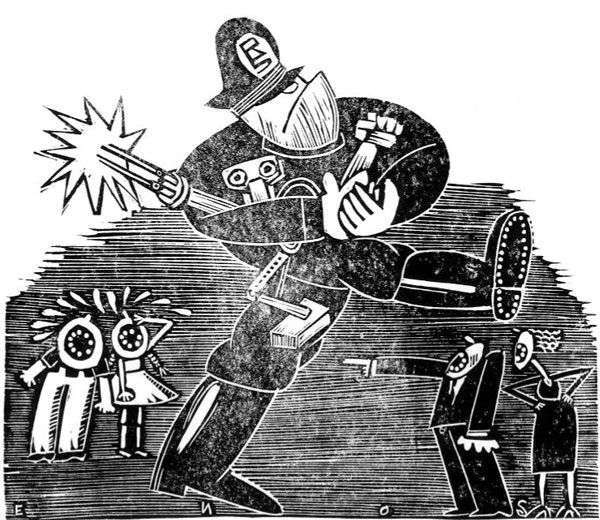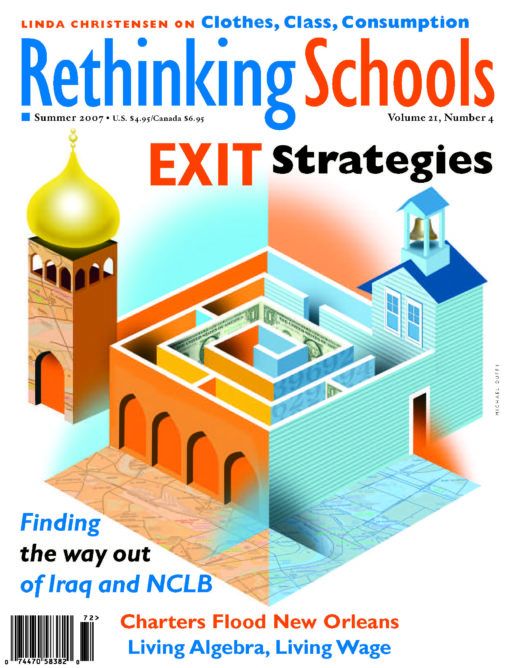Lego Fascists’ (that’s us) vs. Fox News
Illustrator: Randall Enos

It’s been a while since we’ve been called fascists. But this has been a strange couple of months.
The winter 2006-07 issue of Rethinking Schools featured “Why We Banned Legos” by Ann Pelo and Kendra Pelojoaquin, teachers at Hilltop Children’s Center in Seattle. We had intentionally given the article a provocative title, and knew that many people’s first reaction would be: No, not Legos! What could possibly be wrong with Legos? We also knew that those readers who probed beyond the playful headline would be rewarded with an extraordinary piece that recounted how a group of teachers investigated children’s play in order to discover the lessons children were absorbing about power, ownership, authority, and cooperation—and how those teachers responded. And by the way, Legos are not banned at Hilltop and never were; Hilltop teachers simply removed them temporarily to help focus students’ attention on issues of fairness.
Then the email began to pour in:
You Teachers Are Fascists!!! To Ban Legos and Brainwash Them Like This!…
You don’t want us to defend ourselves against the Islam-o-fascist Terrorists you just want us to roll over and die or convert to Islam…
If this does NOT prove once and for all that the Teachers Unions are full of Socialist S.O.B’s! Nothing will! Break Up the Damn Teachers Unions!!!
A woman writing from Augusta, Ga., offered her opinion more economically:
“Ya’ll are just plain NUTS!”
Right-wing bloggers, evidently taking a break from defending the Iraq war, began the “Legos” assault. Rush Limbaugh and other AM radio talk show hosts picked up the story. And finally, Fox television ran a segment on an evening newscast, “Big Story, Big Outrage.” (A Google search of “Why We Banned Legos” in late April pulled up over 17,000 entries.)
Many of the critics appeared to read no further than the winter issue’s headline and offered passionate testimonials on the benefits of Legos. But others, like John J. Miller writing in the National Review Online, inferred deeper implications. In a March 27 posting, Miller expressed outrage that youngsters at Hilltop sometimes use Legos to construct “community meeting places.” Miller declared that his kids would never dream of something so “rotten,” as he put it. “Instead, they make monster trucks, space ships, and war machines. These little creations are usually loaded with ion guns, nuclear missiles, bunker-busting bombs, force-field projectors, and death-ray cannons. Alien empires have risen and fallen in epic conflicts waged in the upstairs bedrooms of my home.” If children don’t play war and empire then evidently the “latte-sipping guardians” in Seattle have led kids astray.
Common to Miller et al.’s critiques is an aversion to the notion that everything that goes on in school—including play—teaches values. Our critics appear content to let children absorb without reflection the values from the broader society—competition, militarism, consumerism, aggression, selfishness. By contrast, “Why We Banned Legos” tells the story of the Hilltop teachers who seek opportunities to help children reflect about “the meaning of power and ways to organize communities which are equitable and just.” (You can read more about the Hilltop approach to early childhood teaching and the center’s response to the Legos controversy at www.hilltopcc.com.)
Critics also derided Pelo and Pelojoaquin’s insistence that children can be encouraged to question inequality in the worlds they create in their play and consider alternatives. One blogger was indignant: “What happens when [children] grow up and not everyone wins?—i.e., injustice happens, deal with it; children should not be taught to question it, to think of democratic alternatives, but should simply see unfairness as a natural state of affairs.” Another blogger at a site called “The Sixth Column” wrote: “[C]hildren will not be prepared to face brutal competition which makes up real life outside of the carefully constructed feel-good environment found in many of today’s classrooms… In the real world, not everyone will be able to participate in ‘the power structure.'” Like these attacks on the article, many writers insisted that injustice was eternal and that questioning it was not merely futile, but misled children about human nature and the world that they would inherit.
Underlying much of the blog and email commentary was a profound disregard for children’s capacities to reflect together about their own interactions and to thoughtfully discuss notions of fairness. As one blogger wrote, the conversations among children described in “Why We Banned Legos” revealed “willful manipulation of young minds…” — presumably because in the real world, kids could never think like this on their own. This was a revealing criticism. Because what if kids are indeed always making meaning about their world and, with good teaching, are more and more able to express their insights with sophistication? Then we need a curriculum that honors children’s potential, rather than the scripted lessons of memorization and correct answers, favored by so many conservatives.
If these right-wing attacks were confined to the Lego article then we might dismiss them as mere annoyances, reminders of the tenacity of conservative views of schooling. But they seem to be part of a pattern—an emerging attack on social justice teaching itself. For example, when Fox News went after the Legos issue, they turned to Jim Copland of the Manhattan Institute as the sole outside “expert.” (Fox: “How ridiculous is this?” Copland: “Preposterous.”) The Manhattan Institute is a free-market-oriented think tank whose education mission is to promote vouchers, charter schools, and more testing—in public schools only, of course, not private schools. Sol Stern, a Manhattan Institute senior fellow, is waging a smear campaign against social justice education work, most recently attacking the El Puente Academy for Peace and Justice in Brooklyn, Eric Gutstein (University of Illinois-Chicago professor and co-editor of our book Rethinking Mathematics), the New York Collective of Radical Educators, and last April’s New York City math and social justice conference, “Creating Balance in an Unjust World.” Writing in the Rupert Murdoch-owned New York Post, (“Math and Marxism: NYC’s Wack-Job Teachers,” March 20, 2007), Stern first caricatures social justice teaching and then complains that it “violates every commonly accepted standard of ethical and professional responsibility for public school teachers,” and laments that “the city’s Department of Education has so far turned a blind eye.”
In this issue of Rethinking Schools, we include other manifestations of the attack on teaching with a social conscience. Kristan Morrison (“Shaking Foundations“) describes the Virginia Department of Education’s attempt to substitute the social foundations of education requirement for prospective teachers with the courses “Instructional Design Based on Assessment” and “Classroom Management.” In other words, “Teachers, don’t worry about the connection between school and society; just keep the kids quiet and get them to pass those tests.” Similarly, Therese Quinn and Erica Meiners (“Do Ask, Do Tell,“) discuss the recent elimination of “social justice” from the National Council for the Accreditation of Teacher Education (NCATE) standards — the guidelines used by many colleges and teacher education programs.
So why now?
Some of these attacks represent nothing new. They are simply part of the right wing’s ongoing attempt to discredit public schools, and push more “accountability” (read testing), vouchers, and school privatization. (Even though Hilltop Children’s Center is not a public school and its teachers are in the Service Employees International Union, not one of the two teacher unions, neither fact deterred critics, who used the Legos article to attack both public schools and teacher unions—as exemplified in the excerpt from our anti-fascist friend, above.)
But there may be something else afoot. It’s become increasingly difficult to ignore social and environmental ills—whether it’s the climate change crisis, the Iraq war, or growing global inequality. More and more educators now talk about “social justice teaching”—albeit not always with clarity around what this means. With greater frequency, educators seem to recognize that at this crucial juncture in world history, schools need to address the issues of our time; and that at all educational levels, we need a conversation and literature describing how educators can respond effectively.
Inevitably, this curricular exploration calls into question existing cultural patterns and systems of ownership and control that are at the root of today’s crises. And this will step on some powerful toes. This teaching may take the form of early childhood programs encouraging children to reflect on the implications of their play. Or it may take the form of high school math teachers analyzing the concept of “peak oil” in algebra class, or 5th grade teachers prompting students to evaluate the manifold costs of the Iraq war.
This is important and exciting work. Rethinking Schools is committed to helping nurture a grassroots literature of social justice teaching. And we’re committed to defend this teaching wherever and whenever it comes under attack. This is no time to be meek. The world is becoming more perilous by the day. Schools can either be part of the problem or part of the solution.

